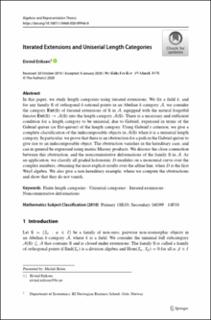Iterated Extensions and Uniserial Length Categories
Peer reviewed, Journal article
Published version
Permanent lenke
https://hdl.handle.net/11250/2835996Utgivelsesdato
2020Metadata
Vis full innførselSamlinger
- Scientific articles [2181]
Sammendrag
In this paper, we study length categories using iterated extensions. We fix a field k, and for any family S of orthogonal k-rational points in an Abelian k-category A, we consider the category Ext(S) of iterated extensions of S in A, equipped with the natural forgetful functor Ext(S) → A(S) into the length category A(S). There is a necessary and sufficient condition for a length category to be uniserial, due to Gabriel, expressed in terms of the Gabriel quiver (or Ext-quiver) of the length category. Using Gabriel’s criterion, we give a complete classification of the indecomposable objects in A(S) when it is a uniserial length category. In particular, we prove that there is an bstruction for a path in the Gabriel quiver to give rise to an indecomposable object. The obstruction vanishes in the hereditary case, and can in general be expressed using matric Massey products. We discuss the close connection between this obstruction, and the noncommutative deformations of the family S in A. As an application, we classify all graded holonomic D-modules on a monomial curve over the complex numbers, obtaining the most explicit results over the affine line, when D is the first Weyl algebra. We also give a non-hereditary example, where we compute the obstructions and show that they do not vanish.
